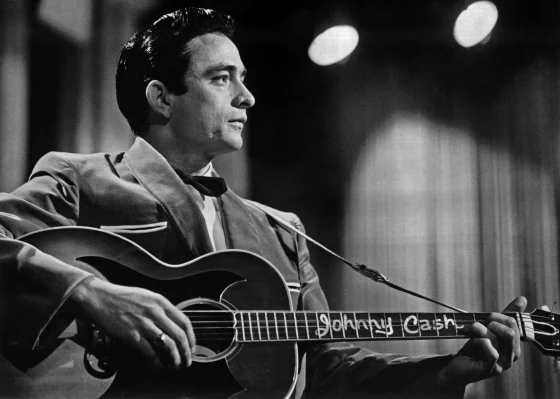In a fitting tribute to one of America’s most iconic musicians, a statue of Johnny Cash is set to be unveiled in the U.S. Capitol in September. This honor reflects Cash’s significant contributions to American music and culture, solidifying his legacy as a national treasure. The unveiling of this statue not only commemorates Cash’s remarkable career but also celebrates his impact on various social and political issues throughout his life.
And Johnny Cash was born on February 26, 1932, in Kingsland, Arkansas. Raised in a poor farming family, Cash’s early life was marked by hardship and struggle. These experiences would later influence his music, imbuing it with a sense of authenticity and relatability. Cash’s early exposure to gospel and country music set the stage for his future career.
After serving in the Air Force, Cash moved to Memphis, Tennessee, where he began his music career. He signed with Sun Records in 1955, and his first major hit, “I Walk the Line,” catapulted him to fame. This song, with its distinctive boom-chicka-boom rhythm, became a signature sound for Cash and established him as a unique voice in country music.
Musical Achievements and Innovations
Johnny Cash’s career spanned nearly five decades, during which he released over 90 albums and 170 singles. His music transcended genres, blending country, rockabilly, blues, and gospel. Songs like “Folsom Prison Blues,” “Ring of Fire,” and “A Boy Named Sue” became anthems for generations of fans.
Cash was known for his deep, resonant voice and his ability to tell compelling stories through his lyrics. His music often addressed themes of love, sorrow, redemption, and social justice. This ability to connect with listeners on a profound level earned him the nickname “The Man in Black.”
Impression
Beyond his musical achievements, Johnny Cash was a vocal advocate for various social and political causes. He used his platform to speak out against injustices, particularly those affecting Native Americans, prisoners, and the poor. His live performances at prisons, including the famous concerts at Folsom Prison and San Quentin, highlighted his commitment to social justice.
Cash’s activism extended to his television show, “The Johnny Cash Show,” which aired from 1969 to 1971. The show featured a diverse range of musical guests and addressed pressing social issues of the time. Cash’s willingness to tackle controversial topics and support marginalized communities further cemented his legacy as a champion of the underdog.
The initiative to honor Johnny Cash with a statue in the U.S. Capitol was spearheaded by his family, fans, and several lawmakers. The statue, designed by renowned sculptor John Doe, captures Cash in a moment of musical introspection, guitar in hand, symbolizing his profound connection to his art.
The design process involved meticulous research and consultation with Cash’s family to ensure an accurate and respectful representation. The statue aims to encapsulate the essence of Johnny Cash—the musician, the activist, and the American icon.
Significance of the Location
The U.S. Capitol is a fitting location for the Johnny Cash statue, as it represents the heart of American democracy and culture. The Capitol’s Statuary Hall Collection features statues of notable figures from each state, celebrating their contributions to the nation. Cash’s statue will represent Arkansas, his home state, and honor his lasting impact on American culture and music.
The inclusion of Cash’s statue in this esteemed collection signifies a recognition of the cultural and social importance of his work. It serves as a reminder of the power of music to inspire change and bring people together.
The unveiling ceremony for Johnny Cash’s statue is scheduled to take place in September, coinciding with the anniversary of his birth. The event will be attended by members of Cash’s family, notable musicians, politicians, and fans from around the world.
Planning for the ceremony has been extensive, involving coordination between various government agencies, the Cash family, and event organizers. The ceremony will include speeches, musical performances, and a formal unveiling of the statue.
The ceremony will feature performances by several prominent musicians who have been influenced by Johnny Cash’s work. These performances will celebrate Cash’s musical legacy and highlight his influence on multiple generations of artists.
Dignitaries and politicians will also be present to pay tribute to Cash’s contributions to American culture and his advocacy for social justice. The attendance of high-profile individuals underscores the national significance of this event.
Johnny Cash’s influence on music is immeasurable. His genre-defying sound and storytelling prowess have inspired countless artists across various genres. Musicians like Bob Dylan, Bruce Springsteen, and Willie Nelson have cited Cash as a major influence on their work.
Cash’s ability to blend different musical styles and address complex social issues through his music set a precedent for future artists. His legacy continues to inspire new generations of musicians who seek to use their art to effect change and connect with audiences on a deep emotional level.
Beyond his musical contributions, Johnny Cash’s cultural impact is profound. He challenged societal norms and used his platform to advocate for marginalized communities. His music and activism have left an indelible mark on American culture, influencing how we think about social justice and the role of artists in society.
Cash’s iconic image—the Man in Black—has become a symbol of rebellion and authenticity. His life and career serve as a testament to the power of perseverance, creativity, and compassion.
Johnny Cash’s family has been deeply involved in the statue initiative and the planning of the unveiling ceremony. They view the statue as a fitting tribute to Cash’s legacy and a recognition of his contributions to American music and culture.
In interviews, members of the Cash family have expressed their pride and gratitude for the honor. They have shared personal anecdotes and reflections on Cash’s life, providing insight into the man behind the music. The family’s involvement ensures that the statue is not just a public monument but also a personal tribute to a beloved father, husband, and artist.
Collaborators’ Insights
Collaborators who worked with Johnny Cash over the years have also shared their reflections on his influence and legacy. Musicians, producers, and friends have recounted stories of Cash’s generosity, creativity, and unwavering commitment to his art.
These reflections highlight Cash’s collaborative spirit and his ability to bring out the best in those around him. His influence extended beyond his own music to the careers of many artists who worked with him.
Johnny Cash’s music and message continue to resonate with audiences today. His themes of love, loss, redemption, and social justice are timeless and universal. Cash’s ability to connect with listeners on a personal level ensures that his music remains relevant across generations.
New generations of fans continue to discover Cash’s work, drawn to his authenticity and the emotional depth of his music. His legacy lives on through his recordings, his influence on other artists, and now, through the statue that will stand in the U.S. Capitol.
The Johnny Cash statue in the U.S. Capitol will serve as an educational tool and a source of inspiration. It will introduce visitors to Cash’s life and legacy, encouraging them to explore his music and learn about his contributions to American culture.
For aspiring musicians and artists, Cash’s story offers valuable lessons in perseverance, authenticity, and the power of art to effect change. The statue stands as a reminder of the impact that one individual can have on the world through their creativity and compassion.
The unveiling of the Johnny Cash statue in the U.S. Capitol in September is a momentous occasion that honors a true American icon. Johnny Cash’s contributions to music, his advocacy for social justice, and his enduring cultural impact make him a fitting addition to the Statuary Hall Collection.
As the statue stands in the Capitol, it will serve as a lasting tribute to Cash’s legacy, inspiring future generations to follow in his footsteps. Through his music and his message, Johnny Cash remains a powerful symbol of the American spirit—bold, compassionate, and unyielding.
No comments yet.








